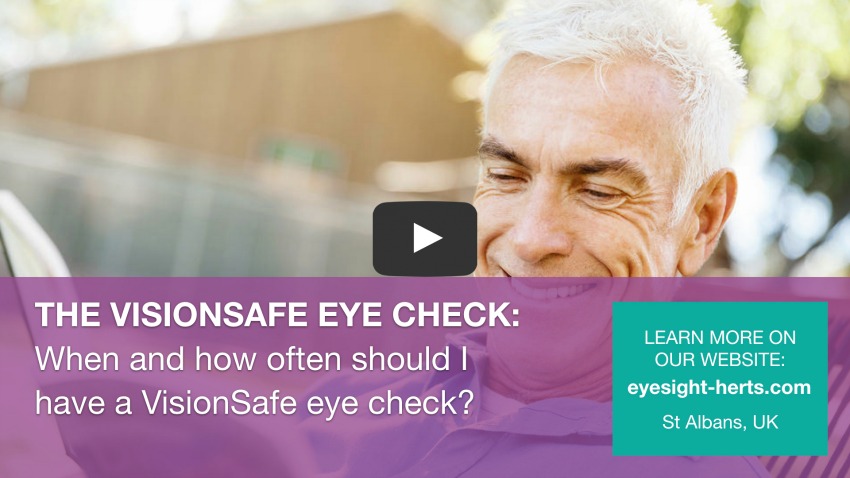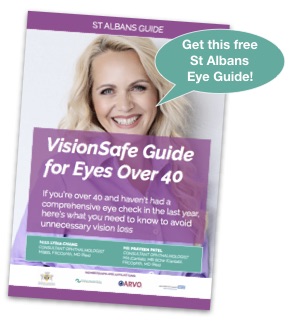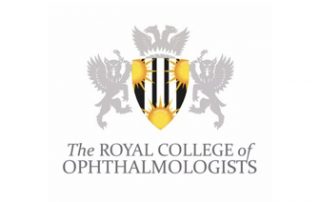Are you over 40 and haven’t had a comprehensive eye check done in the last year? A VisionSafe Eye Check can help you know if flashes and floaters are anything to be concerned about
Flashes and floaters
Symptoms of flashes of lights or floating dots in the vision can be indicative of a separation of the gel-like fluid (vitreous) in the eye from the retina (posterior vitreous detachment). Rarely, these symptoms can be associated with retinal detachment in which the light-detecting layer at the back of the eye (the retina) comes away from the eye leading to loss of vision.
What causes flashes and floaters?
Separation of the gel-like fluid (vitreous) in the eye from the retina (posterior vitreous detachment). Rarely, these symptoms are associated with retinal detachment in which the light-detecting layer at the back of the eye (the retina) comes away from the eye leading to loss of vision.

At a Glance
TREATMENT OPTIONS
See us for a VisionSafe Eye Check if you’re concerned about flashes and floaters
YOUR SPECIALIST
How do you know you have flashes and floaters?
Symptoms include floating dots in the vision and or flashing lights.
Our Patients Say…

“Extremely personable and reassuring. Knowledgeable. Explained options.Successful treatment so far.”

“Most attentive and sympathetic to a patient as well as explaining carefully any procedures.”

“Brilliant! Highly recommend.”

“Very professional yet personal and friendly. Calm & reassuring environment and personal at all levels.”

“Dr Patel explained everything clearly and carefully. No feeling of rush or push to have more procedures. Very friendly & charming reception throughout the clinic.”

“Thank you to Dr P for recommending me. I travelled from Kent and it was an extremely thorough consultation.”

“Everything well explained – great care & understanding. Would thoroughly recommend.”

“I was dealt with very professionally with great care to detail and treated with great kindness. Thank you.”

“I am impressed! You are very thorough.”

“Fuss-free and efficient. Friendly and reassuring.”

“This is an extremely well-run clinic and the staff are kind, understanding and efficient.”

“Very thorough examination & informative discussion.”
Get a consultation for flashes and floaters in St Albans
If you suspect you have flashes or floaters, book an eye consultation that includes:
- Clinical History
- Vision measurements
- Eye examination (dilated examination of the peripheral retinal to exclude retinal tears or retinal detachment)
- Retinal imaging tests (colour fundus photography and optical coherence tomography imaging)
An urgent assessment of the problem is warranted to help identify people with retinal detachment needing treatment. All patients with new floaters and flashing lights should have an eye examination and appropriate tests within 24 hours of the onset of symptoms wherever possible to help exclude a diagnosis of retinal detachment or retinal tear. If the problem turns out to be a separation of the gel (posterior vitreous detachment) with no evidence of retinal tears or retinal detachment then in most cases the symptoms should settle over time.
Contact us to book your consultation in St Albans.
Latest news from your eye doctor in St Albans
We regularly share new videos and blog posts for our St Albans patients about common eye questions and concerns. You can subscribe at the bottom of this page to receive the latest updates.
Vision loss after 40: A VisionSafe Eye Check might catch signs of AMD, glaucoma, macular or retinal conditions.
Vision loss after the age of 40 is common, and there are several reasons this happens. One of the most prevalent reasons is an age-related change in our focusing which means we are not able to read small print easily without glasses (also known as presbyopia). However, there are more serious eye conditions which can lead to irreversible vision loss if not detected at an early stage.
What is macular degeneration?
AMD is a condition which affects the retina, the light-sensitive membrane at the back of the eye. As we get older, we develop an accumulation of waste material underneath the retina. This accumulation can affect the function of the light-sensitive cells.
What is glaucoma treatment and how does glaucoma treatment work?
There are different types of glaucoma treatments. The mainstay of glaucoma treatments is to reduce intraocular (eye) pressure to slow down or stop the disease from worsening.
Memberships and affiliations
Our Consultant Ophthalmologists love to stay on top of the latest in eye treatment options for patients through regular industry meetings, journals and research.
Request a Call Back
Whether you’d like to book a VisionSafe Eye Check, or discover your eye treatment options, give us a call on: 01727 227 013 or request a call back below:










